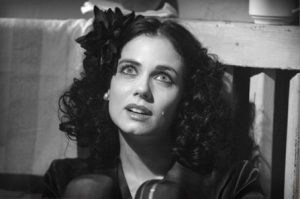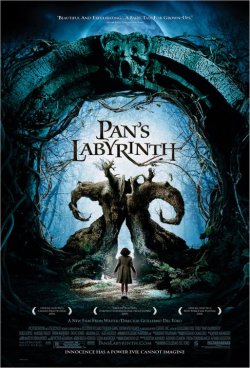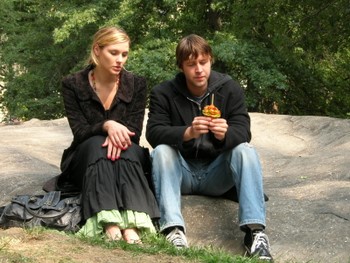The Dark Knight: Haiku Squared
Yet, while absorbing,
the movie is troublesome,
lesser than Begins.
The former – patient,
its arc elegant. This? A
relentless straight line.
Yet, while absorbing,
the movie is troublesome,
lesser than Begins.
The former – patient,
its arc elegant. This? A
relentless straight line.
 Now that filmmaker Robert Altman has died, we’ll find out how prophetic his 1990 film Vincent and Theo turns out to be.
Now that filmmaker Robert Altman has died, we’ll find out how prophetic his 1990 film Vincent and Theo turns out to be.
 The only connection that I could quickly find between screenwriter Guillermo Arriaga and novelist Paul Auster is that they had a public “conversation” earlier this year. (The promised subjects suggest at best a superficial relationship: “the art of filmmaking, writing, and – yes – Hollywood.” How pedestrian.) This is curious to me, because Arriaga’s script for the Tommy Lee Jones-directed The Three Burials of Melquiades Estrada is classic Auster.
The only connection that I could quickly find between screenwriter Guillermo Arriaga and novelist Paul Auster is that they had a public “conversation” earlier this year. (The promised subjects suggest at best a superficial relationship: “the art of filmmaking, writing, and – yes – Hollywood.” How pedestrian.) This is curious to me, because Arriaga’s script for the Tommy Lee Jones-directed The Three Burials of Melquiades Estrada is classic Auster.
 Rather than merely join the chorus of those who dismissed Brian De Palma’s The Black Dahlia, and rather than cast a dissent from the general critical favor accorded The Illusionist, I’ll respond to critics I enjoy and respect whose perspectives on these movies differ significantly from mine.
Rather than merely join the chorus of those who dismissed Brian De Palma’s The Black Dahlia, and rather than cast a dissent from the general critical favor accorded The Illusionist, I’ll respond to critics I enjoy and respect whose perspectives on these movies differ significantly from mine.
A key reason Dirty Pretty Things works so well is that the audience can never be sure in what direction it will go. It might be a sober exploration of issues related to immigration, or it might be a romance, or it might be a humanistic thriller, or it might be a Lynchian mystery, or … . It’s all those things, actually, and at least pretty good at all of them. The movie is nimble, and just when you think you’ve nailed it, it swerves in another direction.
 It’s no surprise that Jen Chapin was pulled in several directions. Her father, the late Harry Chapin, is most famous for writing and performing “Cat’s in the Cradle” but was also a humanitarian, co-founding World Hunger Year in 1975. Jen Chapin is following her own social-justice calling.
It’s no surprise that Jen Chapin was pulled in several directions. Her father, the late Harry Chapin, is most famous for writing and performing “Cat’s in the Cradle” but was also a humanitarian, co-founding World Hunger Year in 1975. Jen Chapin is following her own social-justice calling.
Birth is the perfect antidote for anybody who thinks reincarnation is a romantic notion, allowing for a reunion with the spirit of a loved one who has died. By mining the practicalities of the situation, the movie becomes a rare work that humanizes and seeks to understand the effects of reincarnation instead of merely employing it for cheap horror or cheesy romance.
 I was struck by something Pan’s Labyrinth writer/director Guillermo del Toro said in an interview: Question: “So often in fairy-tale analysis, there’s a tendency to read any story of a young girl as a psychosexual parable, but this film specifically doesn’t go that way.” Answer: “Not at all. I consciously avoided it, not out of prudishness – though I probably am prudish – but out of the same reason why I tried to avoid the myth of vampirism in Cronos through using the most completely unerotic window I could; I tried to approach it like an addiction. In Pan’s Labyrinth, I knew that the psychosexual angle was really tired; it felt very 1980s for me, and I felt this was a movie about a girl who was on the threshold of making a choice, where she could cease to be a girl, but it was not about sexual identity.” Perhaps he should have told that to the movie’s designers and marketers.
I was struck by something Pan’s Labyrinth writer/director Guillermo del Toro said in an interview: Question: “So often in fairy-tale analysis, there’s a tendency to read any story of a young girl as a psychosexual parable, but this film specifically doesn’t go that way.” Answer: “Not at all. I consciously avoided it, not out of prudishness – though I probably am prudish – but out of the same reason why I tried to avoid the myth of vampirism in Cronos through using the most completely unerotic window I could; I tried to approach it like an addiction. In Pan’s Labyrinth, I knew that the psychosexual angle was really tired; it felt very 1980s for me, and I felt this was a movie about a girl who was on the threshold of making a choice, where she could cease to be a girl, but it was not about sexual identity.” Perhaps he should have told that to the movie’s designers and marketers.
 Writer/director David Spaltro’s debut feature …Around concerns a film-school student who lives out of train stations in New York City, and the movie has such a distinctive, Pollyanna view of homelessness that it’s either completely divorced from reality or born of some charmed experience. In an interview last month, Spaltro called …Around “a very personal story to me. I never use the term ‘biography’ or ‘autobiography,’ because I think even if you’re being extremely honest, when you start writing or creating anything, it’s always fiction in some way, because you can only tell your perspective or your memories.” That’s a roundabout way of saying that Spaltro lived out of a train station while going to film school. He put his tuition on credit cards, aiming to pay the minimum each month, but “then I realized I’d have no money for living.” He read an article about a student calling a public library home, and … there you go.
Writer/director David Spaltro’s debut feature …Around concerns a film-school student who lives out of train stations in New York City, and the movie has such a distinctive, Pollyanna view of homelessness that it’s either completely divorced from reality or born of some charmed experience. In an interview last month, Spaltro called …Around “a very personal story to me. I never use the term ‘biography’ or ‘autobiography,’ because I think even if you’re being extremely honest, when you start writing or creating anything, it’s always fiction in some way, because you can only tell your perspective or your memories.” That’s a roundabout way of saying that Spaltro lived out of a train station while going to film school. He put his tuition on credit cards, aiming to pay the minimum each month, but “then I realized I’d have no money for living.” He read an article about a student calling a public library home, and … there you go.
Near the end of Nathaniel Kahn’s engaging and illuminating documentary My Architect: A Son’s Journey, one of his interview subjects suggests that some people with greatness in them must be excused for being boorish, emotionally absent, or simply insufferable as human beings. They should be forgiven because they have a higher calling: God’s work.